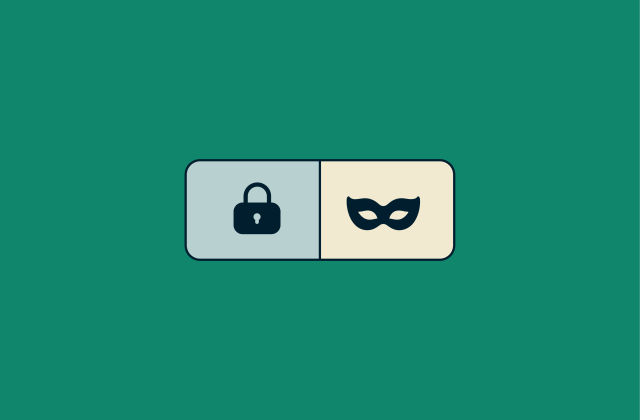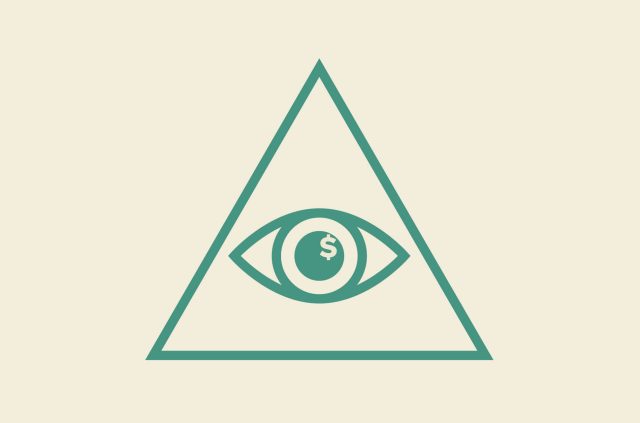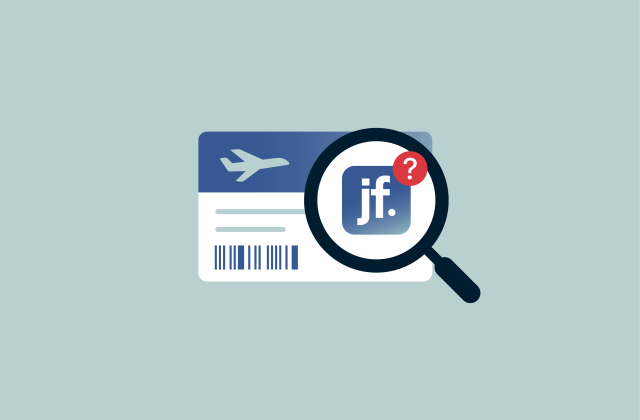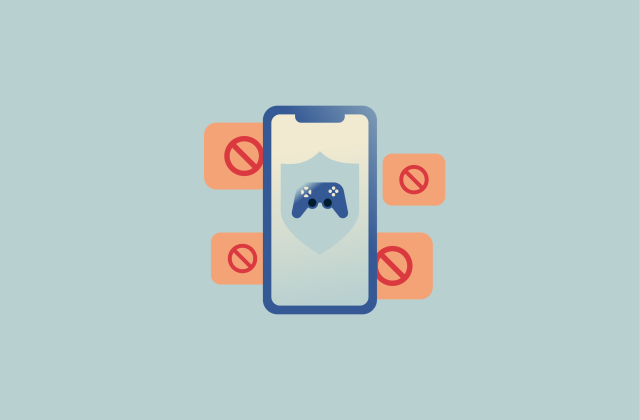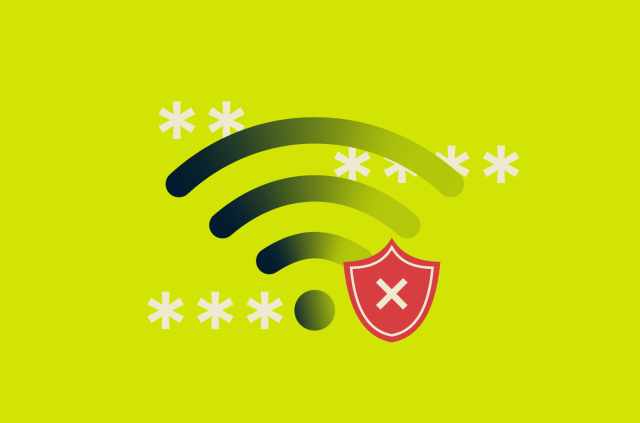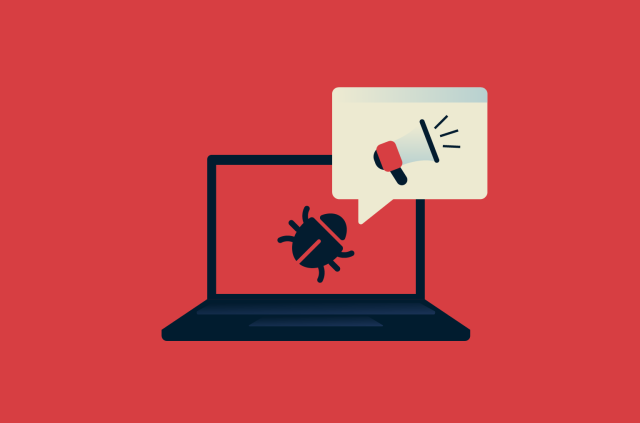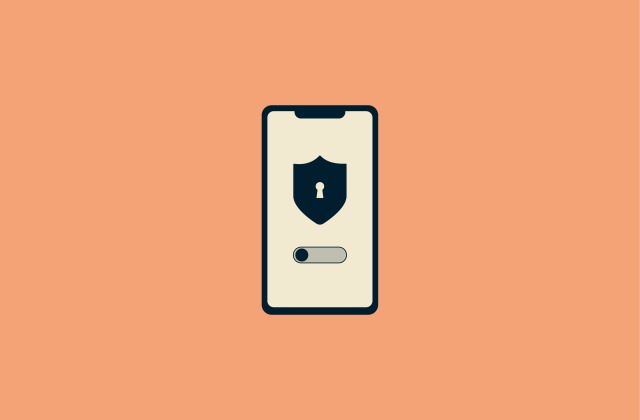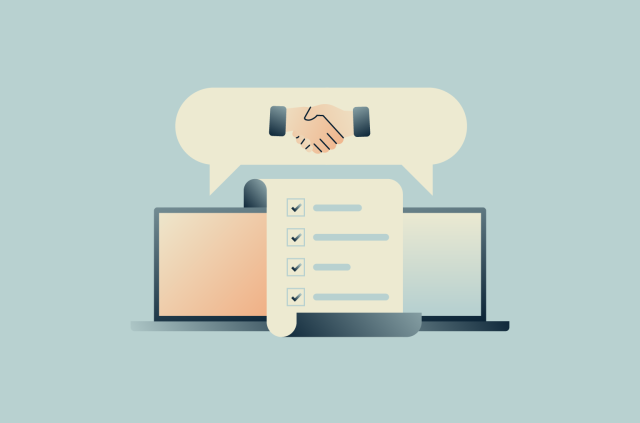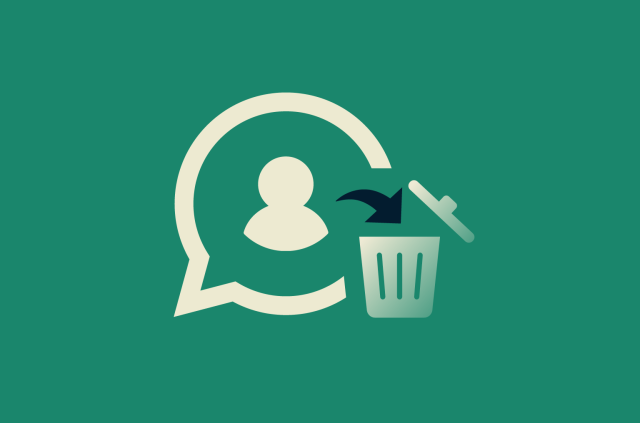What is data anonymization? Benefits, methods, and best practices

Companies regularly collect data on their customers, which they can use for various purposes, including selling to other organizations.
However, to comply with data privacy regulations, they may need to anonymize it or take other steps to protect user privacy, depending on applicable laws.
This guide explores what data anonymization is, how it works, and why it’s not as foolproof and flawless as it may first seem.
What is data anonymization?
In a nutshell, data anonymization is the process of making user data anonymous. It involves the use of various techniques, including the removal, masking, or modification of key pieces of personally identifying information (PII), with the end goal of making the data completely unidentifiable.
As an example, a retail company might collate data from its customers, which includes their names, addresses, and phone numbers, as well as the numbers and types of products they bought. It might want to use that data to learn more about purchasing trends or to inform its next marketing campaign, but it first needs to anonymize it. 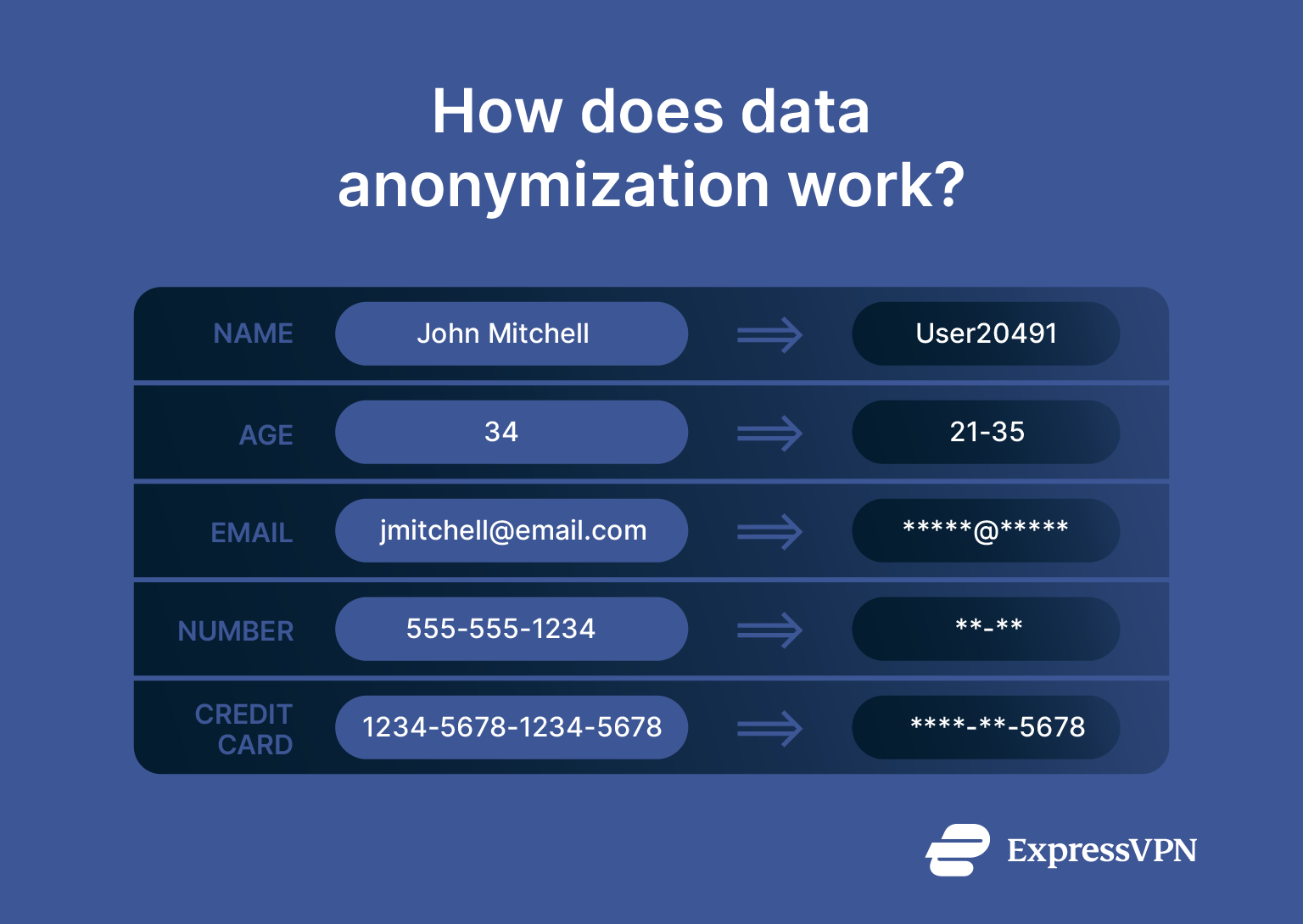 So, it gets rid of or masks the PII, such as the names and phone numbers, hiding anything that could be tied back to real people. It can then analyze the anonymized data internally or share it with marketing agency partners without compromising the privacy of its customers.
So, it gets rid of or masks the PII, such as the names and phone numbers, hiding anything that could be tied back to real people. It can then analyze the anonymized data internally or share it with marketing agency partners without compromising the privacy of its customers.
How does data anonymization work?
Data anonymization works by transforming data in such a way that it removes any personal identifiers or pieces of information that could be tied to a specific individual or group. There are various data anonymization techniques that companies can use to do this, such as data masking, data swapping, and data perturbation, which we’ll look at in closer detail later on.
Why is data anonymization important?
There are several reasons why data anonymization is important and even necessary in many fields and industries.
The first, and most obvious, is because it protects people. Companies collect a lot of data from their customers, which could include anything from names and addresses to credit card numbers. They might want to use or exchange that data for various purposes, but if it fell into the wrong hands, people could fall victim to identity theft, fraud, or serious privacy violations. Data anonymization helps reduce these risks.
Businesses also have to abide by certain data privacy regulations, which control how they store, manage, and use people’s data. The General Data Protection Regulation (GDPR) is an example of these regulations. If companies wish to conduct business in areas where these regulations apply, they have to practice proper data anonymization.
Effective data anonymization is also important for the credibility and reputation of businesses and organizations. People won’t want to hand over their data to companies that don’t treat it with care but will be more trusting of those that effectively anonymize their data and take steps toward risk mitigation and ethical data usage.
Data anonymization vs. data deidentification vs. pseudonymization
In addition to data anonymization, other techniques can make data harder to link to specific individuals, including deidentification and pseudonymization. These techniques all share some traits but also have key differences in terms of their scope, methodology, and risks.
What is data deidentification?
Data deidentification, like data anonymization, aims to protect privacy and remove identifying information from datasets. However, it focuses exclusively on removing or modifying specific pieces of PII, like Social Security numbers, names, and credit card numbers, and doesn’t use the same broad range of techniques as data anonymization, nor does it treat data as thoroughly.
This method is often employed in use cases that call for a balance between privacy and data utility, like data for healthcare. The data isn’t changed as much as it would be with anonymization, which can make it more useful and valuable from an analytical standpoint but also results in more risks of potential identification.
What is pseudonymization?
Pseudonymization is a form of data deidentification in which pseudonyms are assigned in place of personal identities in sets of data. For example, instead of customer names, randomly generated names may be used instead, or code names like “Customer0001,” or even just random series of numbers.
Again, this is done to help protect people’s privacy, but it’s typically the least disruptive to the data structure, which makes it useful in ongoing processes where reidentification is necessary. This also means it offers the least privacy protection if safeguards fail.
It’s important to note that under GDPR, pseudonymized data is still considered personal data because it can be reidentified using additional information. 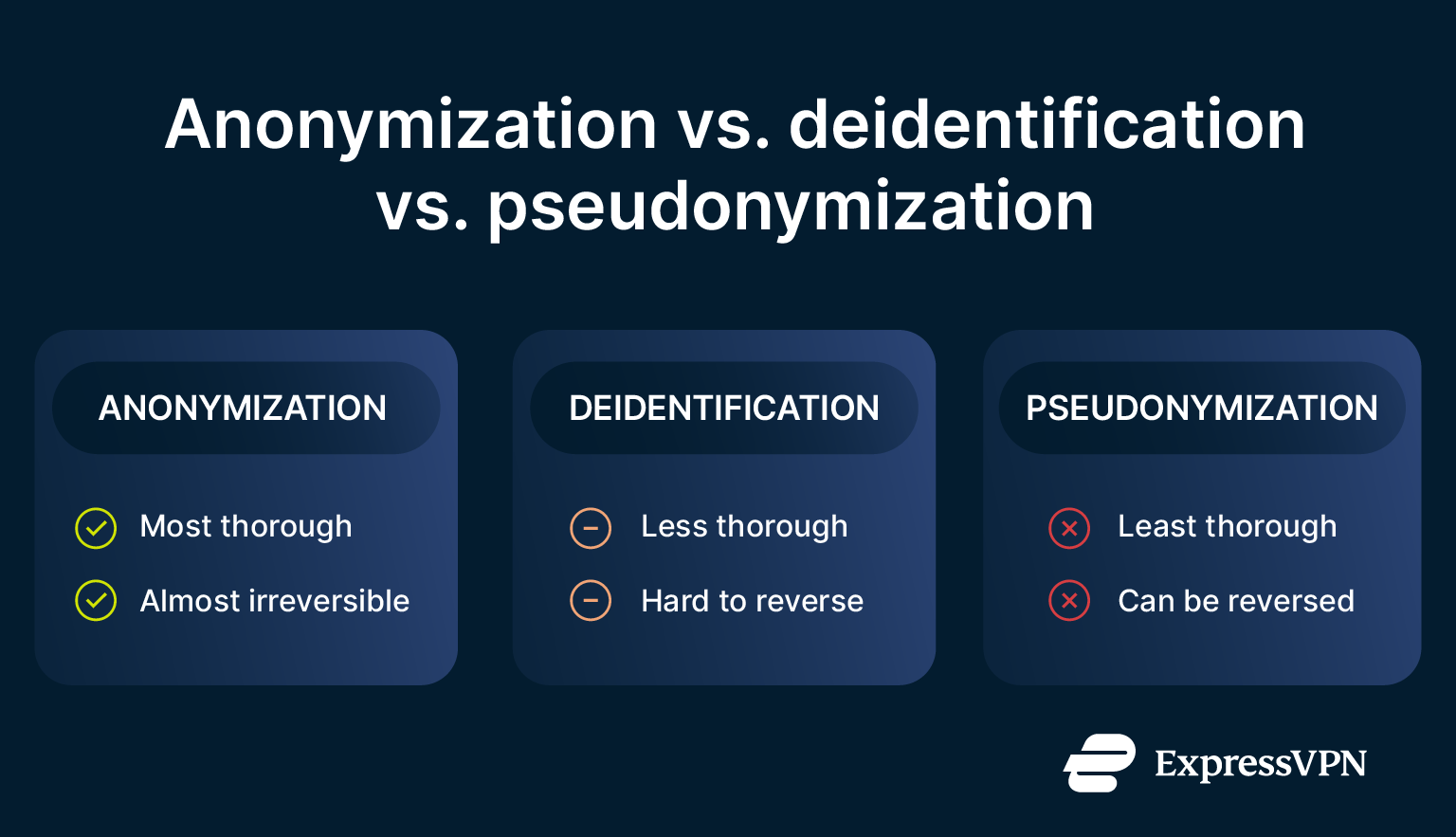
Key differences between these methods
Of the three methods, data anonymization is the most effective at making data completely unidentifiable. It has the most dramatic and impactful effect on the data, as it uses the broadest range of tools and techniques. This results in data that has very little in common with its original form, useful for research, open sharing, and other cases where privacy is paramount.
Data deidentification is less thorough but still strives to make data very difficult to link back to any specific person. It strikes a balance between utility and privacy and is helpful in controlled environments, with safeguards in place to limit the risk of reidentification.
Lastly, pseudonymization is the least thorough method, used for analytics and research when reidentification may still be necessary at some stage. It has the least impact on the data.
Data anonymization techniques and methods
Data anonymization can involve a wide range of techniques, such as:
Data masking
Data masking basically means hiding data. That might include swapping words, numbers, or letters out for other ones, like turning a full 16-digit credit card number into “****-****-****-5678.”
Data swapping
Data swapping is when dataset values are rearranged or exchanged between users, like swapping around names, addresses, or purchase histories.
Generalization
This involves broadening or generalizing certain data points to make them less specific. For example, instead of having a user’s age listed as “42,” it could be switched to “40–50.”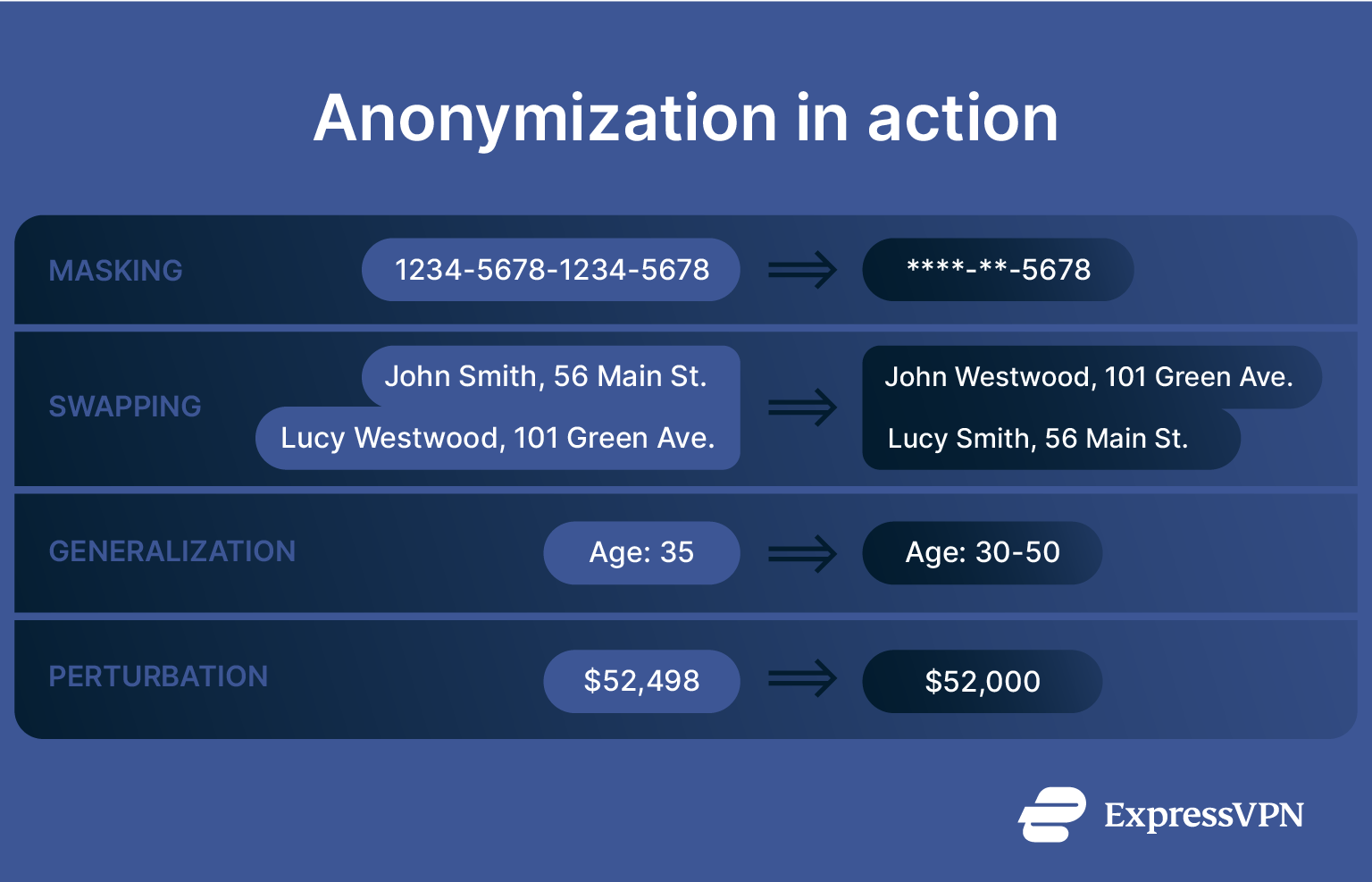
Data perturbation
This is the modification of values to obscure or make them less specific by adding so-called “random noise.” An example could be rounding values to the nearest hundred, like “$4,600” instead of “$4,623.”
Synthetic data generation
This is the creation of completely synthetic or made-up data, like creating fake customer profiles to mix in with the real ones.
Data anonymization algorithms
These are computer programs that are designed to anonymize data automatically in various ways, masking, redacting, and adjusting data points within datasets.
Advantages and disadvantages of data anonymization
Data anonymization is not a flawless practice. It has both pros and cons to take into account.
Pros of anonymized data include:
- It helps protect people’s privacy.
- It ensures compliance with data regulations.
- It provides valuable insights without compromising privacy.
- It builds trust and credibility among users and stakeholders.
- It mitigates the risks of data breaches and leaks.
Cons and limitations of anonymization include:
- It’s possible to reverse the anonymization and reidentify the data.
- Anonymization demands a certain level of time, effort, and resources.
- It reduces the personalization value of datasets.
- It may make datasets less useful for certain forms of analysis.
- Some data may be lost during anonymization.
Risks and challenges: How data gets deanonymized
As mentioned among the limitations of anonymization, anonymized data is never entirely immune to reidentification.
Reidentification attacks
Reidentification doesn’t always require malicious intent. Anyone with access to sufficient auxiliary data, such as public records, social media posts, or other datasets, may be able to match patterns and reverse anonymization.
While cybercriminals may exploit this to commit fraud, researchers, marketers, or data analysts can also unintentionally reidentify individuals during data analysis.
Data correlation techniques
A lot of reidentification attacks focus on comparing and correlating different databases in the hopes of finding commonalities or patterns between them. One dataset, for example, might have user names removed but addresses only partially hidden. Another set might have the addresses and names available, which can be used to figure out individual identities.
These techniques are made more effective by:
- Weak anonymization: If the initial anonymization efforts aren’t strong enough, the data will be easier to uncover, with patterns and traces left behind.
- Availability of additional data: Being able to access and analyze other databases makes it much simpler for bad actors to compare them with anonymized sets.
- Unique data points: If databases contain quite rare or specific data points about individuals, it also becomes easier to tie those to individual people.
Real-world examples of data deanonymization
There have been various examples of data deanonymization in action over the years.
In 2006, Netflix released a large dataset containing anonymized movie ratings from hundreds of thousands of users as part of a public competition to improve its movie recommendation algorithm. Although personal identifiers were removed, researchers from the University of Texas at Austin later demonstrated that the data was not truly anonymous. By cross-referencing it with publicly available user reviews on IMDb, they were able to reidentify some individuals, highlighting the risks of reidentification through data correlation even when datasets appear anonymized.
Also in 2006, America Online (AOL) released a dataset containing 20 million anonymized search queries from 650,000 users as part of a research initiative. Although AOL removed direct identifiers like usernames and IP addresses, each user was assigned a unique ID, allowing search histories to be linked. Reporters from The New York Times used these patterns to reidentify individuals, demonstrating how seemingly anonymized data can still pose serious privacy risks.
Data anonymization in compliance and regulations
Data anonymization is an essential step toward compliance with strict data privacy regulations, including GDPR and HIPAA.
How data anonymization helps with GDPR compliance
GDPR regulates how organizations handle the personal data of users within the European Union. However, under GDPR, data only stops being considered "personal data" if it has been truly anonymized, meaning it cannot be reidentified by any party using reasonably available means. In practice, most anonymization techniques still leave some risk of reidentification and may not exempt the data from GDPR's scope.
HIPAA and data anonymization in healthcare
In the US, the Health Insurance Portability and Accountability Act (HIPAA) regulates how sensitive patient data is stored and used. It accepts two methods of data anonymization:
- Safe harbor: This method involves the removal of 18 specific pieces of identifying information from datasets to prevent it from being linked with individual patients. It also requires that the entity has no actual knowledge that the data could still identify a person.
- Expert determination: This method employs various statistical principles to make data almost impossible to reidentify. It must be conducted by a qualified expert who documents that the reidentification risk is very small.
Once data has been anonymized or deidentified using either of these methods, it is no longer classed as personal patient data and is no longer subject to strict HIPAA regulations.
Data privacy laws that require anonymization
Along with the aforementioned examples of GDPR and HIPAA, numerous other data privacy laws and regulatory bodies across the globe demand data anonymization. This includes the California Consumer Privacy Act (CCPA) in the US, the Data Protection Act of 2018 in the United Kingdom, and the Personal Data Protection Act (PDPA) in Singapore.
Best practices for data anonymization
To anonymize data effectively, it is recommended to follow these best practices:
Choosing the right anonymization technique
First, employ the right anonymization method to suit the dataset you’re dealing with and your end goals. As mentioned earlier, a method like pseudonymization is recommended if you want to reidentify the data later on or preserve as much of the original information as possible, but more in-depth methods like masking, perturbation, and swapping help to maximize privacy.
Common mistakes to avoid in data anonymization
- Incomplete: Only removing some identifiers will not completely anonymize data. You have to remove anything that could be used to connect back to a real person.
- Weak techniques: Some techniques are simply less effective than others. Replacing customer names with initials, for instance, is less effective than replacing them with random codes.
- Ignoring other available data: Look for other available datasets that could be cross-referenced against your own as part of reidentification attempts.
- Excessive anonymization: Changing your data too heavily could render it almost worthless from an analytical standpoint.
Future trends in data anonymization
Data anonymization, like many fields of tech, is subject to ongoing change as new tools emerge.
AI and machine learning for data anonymization
AI has so many applications across dozens of industries, from healthcare to media, and it may prove useful for anonymization, too. AI models can be trained to apply complex anonymization processes and algorithms to datasets, instantly masking and modifying data to make it almost impossible to link back to real people.
The role of blockchain in privacy protection
Blockchain-based systems may offer privacy-preserving structures, as blockchain technology operates without the need for any central authority overseeing the flow of data. This allows users to have their own decentralized identities, which are less prone to data leaks or breaches, to operate more anonymously online.
Challenges of anonymization in big data and AI
Unfortunately, upcoming trends aren’t all positive for privacy protection. The same technologies that could be used to strengthen data anonymization may also be used against it. Cybercriminals, for example, could harness the power of AI and machine learning to conduct more effective deanonymization attacks on datasets and reidentify users more easily.
FAQ: Common questions about data anonymization
What is data anonymization?
What are the best data anonymization methods?
What is an example of anonymized data?
Is data anonymization GDPR compliant?
What is the difference between data masking and pseudonymization?
Is data anonymization reversible?
What industries benefit the most from data anonymization?
Take the first step to protect yourself online. Try ExpressVPN risk-free.
Get ExpressVPN



